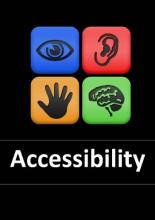Partially sighted and blind voters
For voters who are partially sighted a large print registration form (170 KB PDF) is available to download from the Electoral Commission website.
In the polling station there are large-print versions of the ballot paper. A hand-held copy which can be taken into the polling booth is available from the presiding officer on request. A magnifying card is also available.
The slot on the top of the ballot box is highlighted with white markings to make it easier to insert ballot papers.
Voters who are blind can vote in secret. A special voting device which fits onto the front of the ballot paper is available from the polling station staff who will be happy to explain how to use it.
If you have a disability and require assistance to cast your vote you can take a companion with you to the polling station or you can ask the presiding officer at the polling station for help. If you are assisted by a companion they must be a registered elector or be your spouse, civil partner, parent, brother, sister or child and be aged 16 years of age and over. Your companion will be asked to complete and sign a declaration form which will be issued by the presiding officer. Your companion may only assist one more elector at an election if they have already assisted you.
Alternatively you could apply for a postal vote to allow you to vote from home.
Wheelchair users
The majority of our polling stations now have permanent disabled access.
If you have to use a station with steps, a special temporary ramp will be supplied.
All polling stations have low-level polling booths.
The ballot box will be on a chair, instead of a table, to make it easier to insert ballot papers.
If you have a disability and need help to cast your vote you can take a companion with you to the polling station or you can ask the presiding officer at the polling station for help.
If you are assisted by a companion they must be a registered elector or be your spouse, civil partner, parent, brother, sister or child and be aged 16 years of age and over for local government and Scottish Parliament elections, over 18 for UK Parliament elections.
Your companion will be asked to complete and sign a declaration form which will be issued by the presiding officer. Your companion may only assist one more elector at an election if they have already assisted you.
Alternatively you could apply for a postal vote to allow you to vote from home.
Deaf BSL users or people with hearing difficulties
The Electoral Commision have produced a series of BSL videos on Voter ID.
We are a Text Relay friendly organisation and our contact centre staff are trained by Action on Hearing Loss (formerly known as RNID).
This means that we can now communicate with our customers who use a Textphone. Text Relay connects people who cannot speak or hear on the phone, with other people using a telephone, by providing a text-to-voice and voice-to-text relay system.
Voter ID resources from the Electoral Commission
The Electoral Commission has put together a set of resources on voter ID in different formats, including:
- Braille
- Audio
- BSL
- Easy Read
You can find the resources on the Electoral Commission website.
Accessibility Co-ordinators
Look out for Accessibility Co-ordinators in our polling stations. They will be wearing black t-shirts with this logo on the front:
They will be happy to assist you with any questions you may have about the voting process and will be able to give you specific guidance on any assistance you might require in order to cast your vote.

